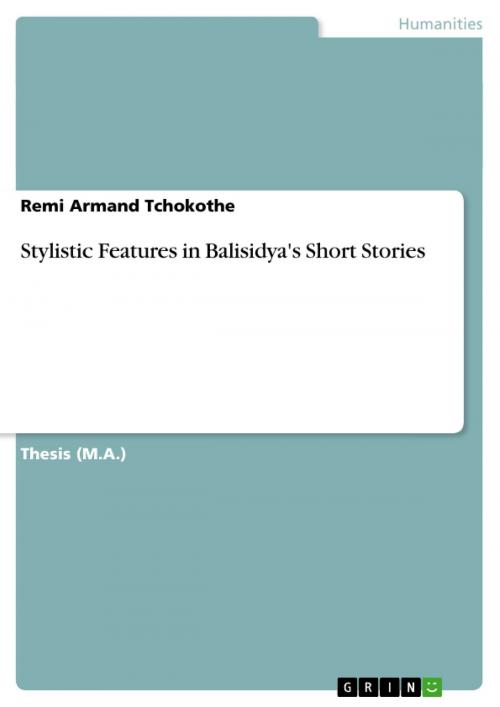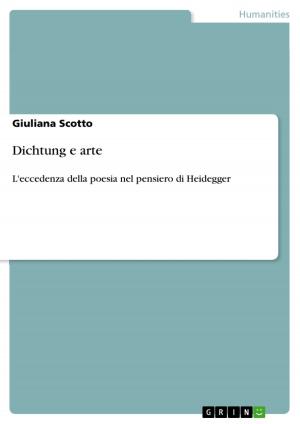| Author: | Remi Armand Tchokothe | ISBN: | 9783640516704 |
| Publisher: | GRIN Publishing | Publication: | January 21, 2010 |
| Imprint: | GRIN Publishing | Language: | English |
| Author: | Remi Armand Tchokothe |
| ISBN: | 9783640516704 |
| Publisher: | GRIN Publishing |
| Publication: | January 21, 2010 |
| Imprint: | GRIN Publishing |
| Language: | English |
Thesis (M.A.) from the year 2006 in the subject African Studies, grade: 1,5, University of Bayreuth (Sprach- und Literaturwissenschaftliche Fakultät), language: English, abstract: Starting with two assumptions namely: the almost misogynist character of swahili literature at its early stages and the strong tendency to reduce literary analyses to content studies, this work proposes a shift of concern by undertaking a stylistic assessment of the collection of short stories Ushindi wa Majeruhi na Hadithi Nyingine by Balisidya Ndyanao. In 1999, Blommaert acknowledged the development of a feminist trend of writing and literary critique epitomized in the works of Penina Mlama and Balisidya Ndyanao. It is urgent to strengthen that this work does not target feminist studies though the late author was an accomplished women's liberationist. At the scholarly level, Balisidya has, according to Said Khamis(2005), introduced pre-modern and challenging experimental features in 'serious' Swahili fiction. Her collection published seven years after her death (1994) echoes without unnecessary camouflage the Tanzanian political context of the 70s and 80s. The 'identity-constitute labels'such as Ujamaa [communism, kinship], Utaifa [African nationalism] and the Azimio la Arusha [Arusha Declaration] that were key words during Nyerere's era are resourcefully audited. The short stories surveyed in this dissertation highlight the need for a new society wherein human values and rights, excellence and common interest should take precedence over selfishness and squandering of resources. This urge for new venues might explain her departure from the realist to the existentialist mode that appropriately conveys despair. Ushindi wa Majeruhi na Hadithi Nyingine is a clear testimony to the Tanzanian literary scene of the 70s that Ohly (1981) labeled 'aggressive prose'.
Thesis (M.A.) from the year 2006 in the subject African Studies, grade: 1,5, University of Bayreuth (Sprach- und Literaturwissenschaftliche Fakultät), language: English, abstract: Starting with two assumptions namely: the almost misogynist character of swahili literature at its early stages and the strong tendency to reduce literary analyses to content studies, this work proposes a shift of concern by undertaking a stylistic assessment of the collection of short stories Ushindi wa Majeruhi na Hadithi Nyingine by Balisidya Ndyanao. In 1999, Blommaert acknowledged the development of a feminist trend of writing and literary critique epitomized in the works of Penina Mlama and Balisidya Ndyanao. It is urgent to strengthen that this work does not target feminist studies though the late author was an accomplished women's liberationist. At the scholarly level, Balisidya has, according to Said Khamis(2005), introduced pre-modern and challenging experimental features in 'serious' Swahili fiction. Her collection published seven years after her death (1994) echoes without unnecessary camouflage the Tanzanian political context of the 70s and 80s. The 'identity-constitute labels'such as Ujamaa [communism, kinship], Utaifa [African nationalism] and the Azimio la Arusha [Arusha Declaration] that were key words during Nyerere's era are resourcefully audited. The short stories surveyed in this dissertation highlight the need for a new society wherein human values and rights, excellence and common interest should take precedence over selfishness and squandering of resources. This urge for new venues might explain her departure from the realist to the existentialist mode that appropriately conveys despair. Ushindi wa Majeruhi na Hadithi Nyingine is a clear testimony to the Tanzanian literary scene of the 70s that Ohly (1981) labeled 'aggressive prose'.















